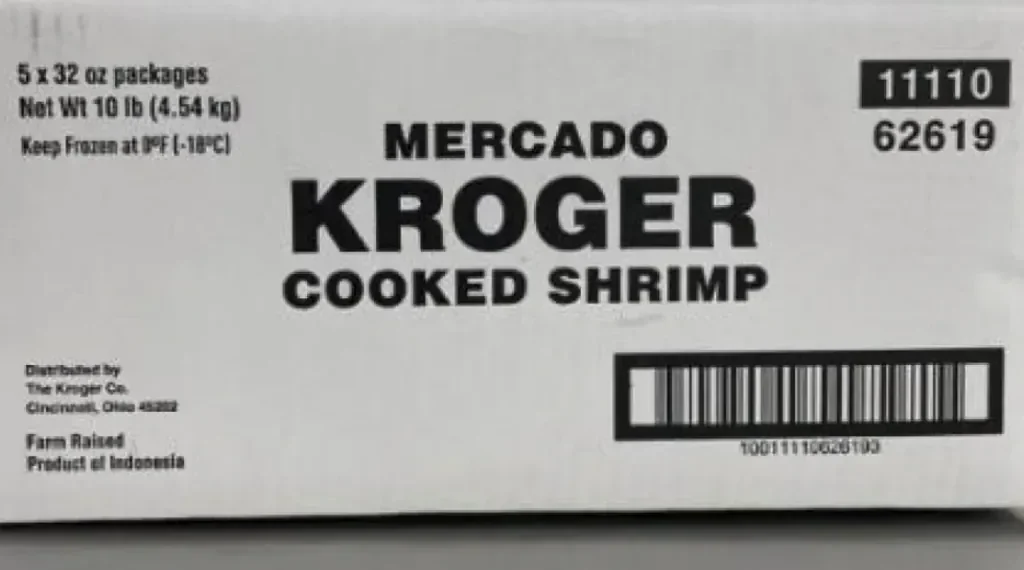Kroger Shrimp Recall Widens Amid FDA Probe Into Possible Radioactive Contamination
Published: September-23-2025, 15:00 EDT
A Seattle-based seafood distributor has expanded its recall of shrimp products sold at Kroger-owned grocery stores nationwide due to concerns about possible radioactive contamination. The U.S. Food and Drug Administration (FDA) said the products may contain trace amounts of cesium 137, a radioactive isotope linked to nuclear activity. Officials stress the health risk is low, but the ongoing investigation highlights gaps in seafood import safety and monitoring.
Expanded Recall Covers 157,000 Pounds of Shrimp
Aquastar Corp. announced on Saturday that it is recalling nearly 157,000 additional pounds of cooked and frozen shrimp. The affected products were sold between June 12 and September 17 across more than 30 states under several Kroger-owned brands.
The recall includes:
-
Kroger Raw Colossal EZ Peel Shrimp (nearly 50,000 bags)
-
Kroger Mercado Cooked Medium Peeled Tail-Off Shrimp (about 18,000 bags)
-
AquaStar Peeled Tail-On Shrimp Skewers (more than 17,000 bags)
The shrimp products were distributed to major grocery chains including Kroger, Fred Meyer, Ralph’s, Smith’s, King Soopers, Mariano’s, Pick ‘n Save, Dillons, and others.
Aquastar previously recalled shrimp in August as part of the same FDA investigation into contamination linked to imports from Indonesia.
FDA Links Contamination to Indonesian Supplier
The FDA confirmed that the shrimp under investigation was imported from PT. Bahari Makmur Sejati (BMS Foods), an Indonesian seafood processor. Earlier this year, FDA inspectors detected cesium 137 in shipping containers from the company and in a sample of frozen breaded shrimp.
Although the shrimp that directly tested positive was not released for sale, the agency warned that other shipments may have been exposed to contamination during production or transport. In response, the FDA issued an import alert in August to block potentially unsafe shrimp from entering the U.S.
U.S. Customs and Border Protection records show that more than 3 million pounds of shrimp from BMS Foods entered U.S. ports in September, underscoring the scale of the issue.
What Is Cesium 137 and Why It Matters
Cesium 137 is a byproduct of nuclear fission and is commonly released from nuclear reactors and weapons testing. The isotope can contaminate soil, water, or industrial environments when radioactive waste is mishandled.
Health experts note that short-term exposure to small amounts of cesium 137 is unlikely to cause immediate harm. However, prolonged consumption of contaminated food could increase risks of cancer and other illnesses.
The FDA said that testing revealed levels of about 68 becquerels per kilogram in the shrimp, well below its safety threshold of 1,200 becquerels per kilogram. Still, the agency emphasized caution, stating the shrimp could pose a “potential health concern” if consumed over extended periods.
Possible
Follow JournosNews.com for professionally verified reporting and expert analysis across world events, business, politics, technology, culture, and health — your reliable source for neutral, accurate journalism.
Source: Contaminated Industrial Metal
Investigators believe the contamination may stem from conditions at or near the Indonesian shrimp processor’s facility. According to the International Atomic Energy Agency (IAEA), evidence suggests exposure could have come from radioactive scrap metal or activities at a nearby smelting plant.
So far, U.S. officials have declined to answer detailed questions from the Associated Press about the source or full scope of the contamination. The uncertainty has fueled calls from consumer groups for greater transparency and tighter regulation of seafood imports.
Regulatory and Industry Response
The FDA continues to monitor shipments from BMS Foods and other suppliers while testing imported seafood for potential contamination. Import alerts remain in place to prevent additional affected products from reaching U.S. grocery shelves.
Kroger and Aquastar both issued public statements emphasizing their cooperation with federal regulators. The companies urged customers who purchased recalled shrimp to return it for a full refund and avoid consumption.
Food safety experts stressed that while the health risk appears minimal, quick action is essential to maintain consumer trust. “Even at low levels, radioactive contamination in food must be taken seriously,” said Dr. Alan Rosen, a professor of environmental health at the University of Washington. “The public deserves clear communication about the risks and the steps being taken to ensure safety.”
Consumer Impact Across the U.S.
The recall affects shoppers in more than 30 states where Kroger operates under multiple store banners. Consumers have been advised to check packaging details carefully and discard or return any affected shrimp.
The incident has also raised questions about supply chain oversight, given the volume of seafood imported annually from Southeast Asia. The U.S. imports more than 90 percent of its seafood, and shrimp remains the single most consumed variety.
Looking Ahead: Food Safety in Global Trade
This case highlights broader challenges in regulating global food supply chains. Experts say contamination events—whether involving bacteria, chemicals, or radioactive materials—underscore the need for stronger international cooperation and inspection systems.
For now, regulators continue to investigate the Indonesian facility, while the FDA maintains its import alert on shrimp products from BMS Foods. Until the source of contamination is fully identified, food safety advocates recommend ongoing testing and stricter monitoring of imported seafood products.
This article was rewritten by JournosNews.com based on verified reporting from trusted sources. The content has been independently reviewed, fact-checked, and edited for accuracy, neutrality, tone, and global readability in accordance with Google News and AdSense standards.
All opinions, quotes, or statements from contributors, experts, or sourced organizations do not necessarily reflect the views of JournosNews.com. JournosNews.com maintains full editorial independence from any external funders, sponsors, or organizations.
Stay informed with JournosNews.com — your trusted source for verified global reporting and in-depth analysis. Follow us on Google News, BlueSky, and X for real-time updates.














